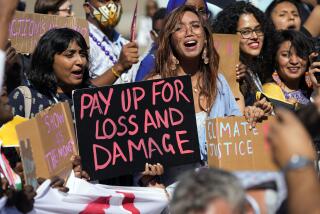U.N. Chief Sets Limit of 30% of Iraqi Oil Revenues for War Reparations : Damages: The figure is less than the 50% proposed by U.S. officials but about what most analysts expected.
- Share via
WASHINGTON — U.N. Secretary General Javier Perez de Cuellar, defining the punitive measures against the aggressive Saddam Hussein regime more clearly, set a maximum limit of 30% Friday on the amount of oil revenue that Iraq will have to divert to pay victims for damage caused by its invasion of Kuwait.
The figure was less than the 50% proposed by some American officials but about what most analysts had expected. It is roughly equivalent to the percentage of oil revenue that Iraq spent on military armaments before it provoked the Persian Gulf crisis last August.
A special commission--made up of representatives of all 15 members of the U.N. Security Council--will meet in Geneva to set the actual percentage that Iraq must pay as reparations. The commission, however, is expected to agree on a figure either at or very close to the maximum 30%.
That percentage has already been denounced by Abdul Amir Anbari, Iraq’s ambassador to the United Nations, as “an impossible percentage to implement.” It is so high, Anbari insists, that Iraq will have a difficult time paying it and still managing to buy basic food and medicine for its people.
Iraq, while accepting the principle that it must pay reparations, has asked the United Nations for a five-year delay before its first payment, a moratorium that was rejected.
It is not clear how soon Iraq will be allowed to sell oil--and begin paying reparations. Iraq is still prohibited by U.N. sanctions from selling oil, and President Bush and other members of the Administration have insisted recently that sanctions will remain in place so long as Saddam Hussein remains the Iraqi leader.
In a recent interview, however, Washington’s permanent U.N. representative, Ambassador Thomas R. Pickering, tried to clarify the Bush Administration rhetoric by noting that U.S. officials had said only that “all possible sanctions” would be maintained until the Iraqi dictator is gone.
Pickering said that there is a difference between “sanctions removed on Iraqi oil exports when it complies with the compensation regime (reparations)” and a general removal of trade sanctions. This presumably means that the United States would have no objection to the U.N. commission in Geneva allowing Iraq to sell oil so that there is money to pay reparations.
But the United States, backed by its allies, has refused to allow Iraq to sell $1 billion worth of oil to buy food and medicine. American officials have said that Iraq has enough foreign exchange and gold to pay for food and medicine.
In a statement read by his spokesman, Francois Giuliani, Secretary General Perez de Cuellar explained how he had arrived at his maximum figure.
“With oil exports expected to reach about $21 billion by 1993,” Perez de Cuellar said, “imports should absorb about 48% of export earnings and debt servicing approximately 22%. I suggest, therefore, that compensation to be paid by Iraq . . . should not exceed 30% of the annual value of the exports of petroleum and petroleum products from Iraq.”
Perez de Cuellar apparently based his figures on a declaration by the Iraqi government that it had the capacity to increase its production from 600,000 barrels a day later this year to 2 million barrels a day in 1992, 2.85 million barrels in 1993, 2.85 million in 1994 and 2.9 million barrels a day in 1995.
But the ban on oil exports--enforced by a naval blockade and by a cutoff in pipeline flows--has been the most successful element in the worldwide sanctions against Iraq. There would have to be some easing of this before Iraq could take care of its internal needs, rebuild its devastated infrastructure, pay off its debts and compensate its victims.
In its resolution setting Iraq’s surrender terms on April 3, the Security Council said that Iraq “is liable under international law for any direct loss, damage--including environmental damage and the depletion of natural resources--or injury to foreign governments, nationals and corporations, as a result of Iraq’s unlawful invasion and occupation of Kuwait.”
It could take many years for Iraq to pay for these damages. Kuwait has estimated its damages at $60 billion. Saudi Arabia is demanding compensation for cleanup costs caused by the deliberate leakage of oil into the Persian Gulf. Thousands of foreign workers are asking compensation for the loss of wages suffered when they were forced to flee from the Gulf region.
There has even been some talk by U.S. officials that they would like Iraq to pay for the U.S.-led Kurdish relief operations. But the April 3 resolution was passed before the conflict between Hussein’s army and Kurdish rebels erupted and thus makes no mention of this kind of compensation.
More to Read
Sign up for Essential California
The most important California stories and recommendations in your inbox every morning.
You may occasionally receive promotional content from the Los Angeles Times.













